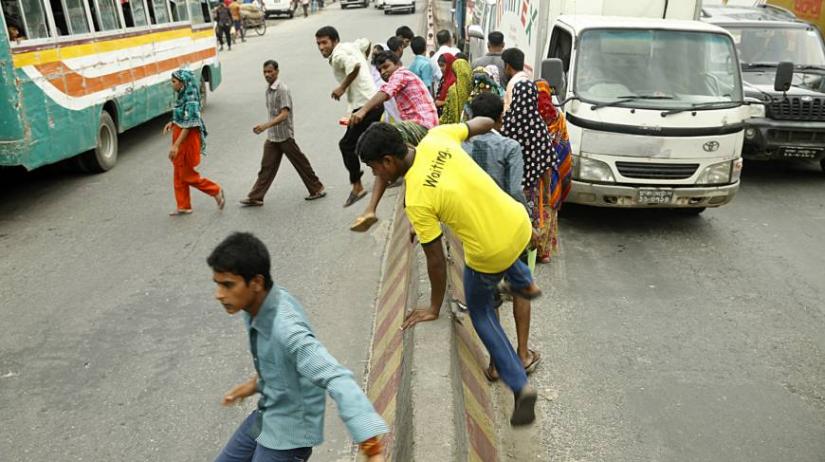 Imagine while you’re reading this piece, your son may be crossing a busy road talking on his mobile phone. Imagine while you’re busy in office, your chauffeur may be talking on the mobile phone and driving your daughter to her school. Imagine your mobile phone’s battery explodes while talking on the phone while charging it. Imagine someone you don’t know has posted your daughter’s photo on the social media without her permission.
Imagine while you’re reading this piece, your son may be crossing a busy road talking on his mobile phone. Imagine while you’re busy in office, your chauffeur may be talking on the mobile phone and driving your daughter to her school. Imagine your mobile phone’s battery explodes while talking on the phone while charging it. Imagine someone you don’t know has posted your daughter’s photo on the social media without her permission.
These are just a few small-but-with-a-big-impact actions that we have been dangerously engaged in. And that’s not all. There are thousands of small acts of ours that may usher in big dangers in our lives; in some cases, they may turn out to be fatal!
Take an account of how many people had passed away by being running over by a train during a phone conversation. That would be uncountable.
Sometimes we blame technology for many ills and various kinds of interpersonal gaps. However, it’s us who actually use the technology — both for positive as well as negative purposes.
It’s us who never think before we give our leap while using the technology that we’re adopting. Do we actually think about the consequences of talking on the phone while crossing the road? Most of us don’t. But it takes a simple commonsense to avoid many dangers in our lives and live happily.
We still drive our cars and talk on our mobile phone. It’s hard to find a country where people still carry this kind of habit. Do we really think of the consequences? We don’t. In a country infested with road accidents, avoiding mobile phone while driving has to be a must-do. Again, it takes a simple commonsense.
If you get out of your home, stand on the pavement and look at the vehicles and the passengers inside them. There are many things happening on the roads that could be avoided with some human commonsense. The vehicles aren’t on the lane that they should be, causing terrible congestions.
The pedestrians who are crossing the roads seem erratic. No-one is using the foot over-bridges; no-one is even looking at the vehicles while crossing the road.
The dividers are too high, but they’re still climbing it; everyone seems in an extreme hurry on the road. Hundreds of people die in traffic accidents due to the fault of themselves; they were not applying their senses or abiding by the laws while commuting.
The pedestrians are not walking on the pavements; they have all gotten down on the road and going to their destination! What would you call all this? Normal? Not at all! We Bengalis are mired with so many acts that may look like so devoid of proper use of senses that at a certain juncture, we lose the count. In table talks and addas, we always mention about our lack of commonsense, but unfortunately we keep on committing them all the time.
We Bengalis are mired with so many acts that may look like so devoid of proper use of senses that at a certain juncture, we lose the count. In table talks and addas, we always mention about our lack of commonsense, but unfortunately we keep on committing them all the time.
Our behaviour on social media has, nowadays, has shown that we’re capable of doing many things without thinking of the consequences. Millions of us believe that the social media has become the prime news source. It has also become a platform for storytelling.
We, the new netizens tend to believe anything unnatural and unverified information that pops up on the social media. We instantly share them without thinking whether it could be correct or whether the information could be damaging in someone else’s life or cause havoc to the state of the affairs around us.
This act of ours is surely questionable and devoid of common sense. There are more than a billion websites and the social media, as it follows an algorithm, sends all those to us. How could all those websites be providing factual information?
Our everyday life is full of such actions that, most of the times, put our own lives at risk. Applying commonsense in our daily life has become a scarce element in our characteristics. The sense to apply commonsense, I believe, develops from within one’s family. The families are the first school that instills the culture to apply that sense in our everyday life.
The current state cannot go on forever; we must change for a better future, for a better life. We certainly would be able to change ourselves. Don’t we all keep advising our children all the time? Why don’t we change by advising ourselves and listen to our own advices? This simple technique would go a long way – commonsense can become more common.
Ekram Kabir is a storyteller. His other works can be found on ekramkabir.com.
 Opinion
Opinion
30729 hour(s) 14 minute(s) ago ;
Morning 04:08 ; Friday ; Apr 19, 2024
Let commonsense be more common
Send
Ekram Kabir
Published : 18:43, Feb 12, 2019 | Updated : 19:39, Feb 12, 2019
Published : 18:43, Feb 12, 2019 | Updated : 19:39, Feb 12, 2019
0 ...0 ...
/hb/
Topics: Ekram Kabir
***The opinions, beliefs and viewpoints expressed in this article are those of the author and do not reflect the opinions and views of Bangla Tribune.
- KOICA donates medical supplies to BSMMU
- 5 more flights to take back British nationals to London
- Covid19: Rajarbagh, Mohammadpur worst affected
- Momen joins UN solidarity song over COVID-19 combat
- Covid-19: OIC to hold special meeting
- WFP begins food distribution in Cox’s Bazar
- WFP begins food distribution in Cox’s Bazar
- 290 return home to Australia
- Third charter flight for US citizens to return home
- Dhaka proposes to postpone D8 Summit
Unauthorized use of news, image, information, etc published by Bangla Tribune is punishable by copyright law. Appropriate legal steps will be taken by the management against any person or body that infringes those laws.
Bangla Tribune is one of the most revered online newspapers in Bangladesh, due to its reputation of neutral coverage and incisive analysis.
F R Tower, 8/C Panthapath, Shukrabad, Dhaka-1207 | Phone: 58151324; 58151326, Fax: 58151329 | Mob: 01730794527, 01730794528


